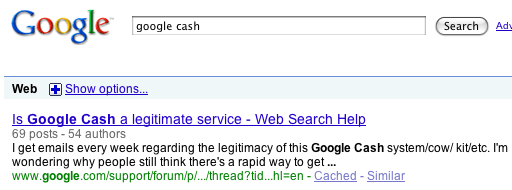Google Cash Scams Targeted By “White Knight” SEOs
A group of search engine optimizers have their sights set on Google Cash. No, they’re not trying to make money off that keyword or the product it represents; they’re trying to influence the natural search results to tell the public that it’s a scam. Google Cash — also known as Google Treasure Chest and Google […]
A group of search engine optimizers have their sights set on Google Cash. No, they’re not trying to make money off that keyword or the product it represents; they’re trying to influence the natural search results to tell the public that it’s a scam.
Google Cash — also known as Google Treasure Chest and Google Money Tree — is already on the federal government’s radar, as Jonathan Hochman explained recently:
According to the feds: “Google Money Tree, its principals, and related entities allegedly misrepresented that they were affiliated with Google and lured consumers into divulging their financial account information by advertising a low-cost kit that they said would enable consumers to earn $100,000 in six months. They then failed to adequately disclose that the fee for the kit would trigger monthly charges of $72.21…”
Jonah Stein has written about it, Google’s Cash Cow – Scam Advertising & Profits, as has David Rodnitsky: Alert – Google Cash Scam. In my searching, Rodnitsky’s article is already on page two of Google’s search results for “google cash.”
Targeting “Google Cash” like this is part of a project that’s being called “White Knight SEO.” Stein says the goal is to dominate the natural search results for “Google cash” (and related terms) with articles and information that will serve to warn consumers.
We hope that we can place advisory content to take over the top 10 results in Google for searches related to common scams and online fraud with a particular focus on areas which are using adwords & adsense to snare victims.
Indeed, there are plenty of PPC ads on the search results pages for “Google cash,” “Google money tree,” and similar terms. At the moment, the natural search results are a mixed bag, but already lean toward pointing out that it’s a scam. The number one result, in fact, is a thread on the Google webmaster forum: Is Google Cash a legitimate service.
Stein and other SEOs are hoping their articles soon join the forum thread on the first page of Google’s results. It’ll be interesting to watch because we know Google doesn’t like coordinated actions that attempt to influence its search results, but in this case don’t the ends justify the means?
Postscript by Barry Schwartz: This is indeed still a major issue and Google is very aware of the issue. Let me give you some history on this topic that goes a bit beyond what Matt has already said above.
Staring in March of this year, these programs started to get pretty heavy. They came under the name of Google Money System, Google Money Kit, Google Cash and so on. It took a few months, but Google began banning those offering them from using AdWords. Most of the bans were automatic, so as time went on, these advertisers were able to find loopholes around the AdWords system to start again.
On July 10th, Google took this scam public with a very visible blog post on their main blog named How to steer clear of money scams. They even added help documentation specifically on being ripped off, trying to help educate those before they are scammed.
Most recently, over the weekend, ABC News covered this scam both on TV and in an article named 10 Telltale Signs of a Work-From-Home Scam. Google then promoted this article in the Google Web Search Help forum in order to drive more attention to this.
As you can see, Google is doing a lot to try to educate and prevent these scams. But often, the scammers, hackers and spammers are at the advantage.
Contributing authors are invited to create content for Search Engine Land and are chosen for their expertise and contribution to the search community. Our contributors work under the oversight of the editorial staff and contributions are checked for quality and relevance to our readers. The opinions they express are their own.
Related stories
